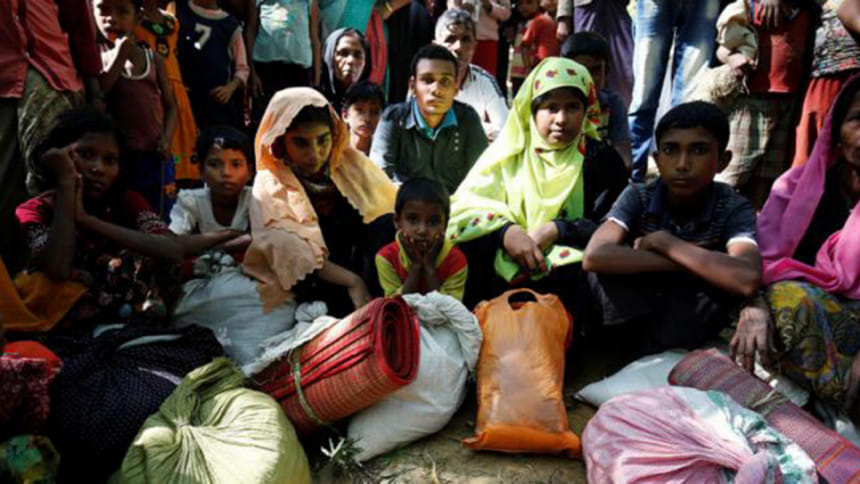It's not responsibility of Bangladesh alone

As Rohingyas continue to pour into Bangladesh in the face of "ethnic cleansing" in Myanmar, diplomats and experts have suggested that Bangladesh should take a firm stance and make effective diplomatic moves to mobilise international support for resolving the crisis.
Without any hesitation, Bangladesh should go for bilateral and multilateral moves to put pressure on Myanmar because the Southeast Asian country itself created the crisis and must resolve it also, they say.
Through an effective diplomatic campaign, Dhaka should also make the international community understand that Bangladesh alone cannot deal with the issue and that the global community has a responsibility to resolve the humanitarian crisis.
Talking to The Daily Star, several former and serving diplomats, and foreign affairs experts said Bangladesh government has long been trying to resolve the Rohingya crisis through “persuasion and mutual understanding”, which apparently encouraged Myanmar to create the crisis over and over again.
But time has come for Dhaka to take a firm position and move forward to end this longstanding problem once and for all, they say.
“It is now time to make the Rohingya crisis an international issue, and seek support from all to resolve it permanently. Bangladesh is the worst sufferer of this Rohingya situation. The international community must come forward to shoulder the responsibility and ensure the rights of Rohingyas,” said international affairs expert Maj Gen (Retd) Abdur Rashid.
The former ambassador said the government appears hesitant to take a firm stance on the issue and convey the message that it would no longer tolerate such an uncalled-for situation created by Myanmar.
“We shouldn't think that Myanmar may be unhappy or BCIM [Bangladesh-China-India-Myanmar economic forum] or BIMSTEC [the Bay of Bengal Initiative for Multi-Sectoral Technical and Economic Cooperation] may be affected if we take a firm stance on the Rohingya crisis that is adversely affecting Bangladesh. We must uphold our national interest and security first,” he said.
He observed that Myanmar would continue to create such crisis, and one day, it would push all its Rohingya citizens into Bangladesh territory if Dhaka continues to maintain its soft stance.
“Of course, we should continue our efforts to solve the problem bilaterally. But we can definitely engage the international community and regional players so that Myanmar refrains from creating such humanitarian crisis that also has global implications,” said the former diplomat, who served as ambassador to the USA and Australia.
Last week, Dhaka decided to launch an all-out diplomatic effort to drum up global support for mounting pressure on Myanmar to resolve the Rohingya crisis.
Foreign ministry officials said the ministry has directed the Bangladeshi envoys in more than 60 countries and the UN bodies to brief the officials concerned in their countries of stay on the influx of Myanmar Rohingyas to Bangladesh in the face of persecution.
At a diplomatic briefing on Thursday, foreign envoys in Dhaka expressed their strong support in resolving the longstanding crisis in a peaceful manner and through dialogue between Bangladesh and Myanmar.
Seeking anonymity, a senior official at the foreign ministry told this correspondent that the government now strongly feels that mounting global pressure on Myanmar is essential as the country is not responsive to Dhaka's steps to establish and maintain friendly relations.
Several officials of the ministry said Bangladeshi envoys abroad have been asked to brief the foreign policymakers and high-ups in the light of the “Strategy Paper on Addressing the Issue of Myanmar Refugees and Undocumented Myanmar Nationals in Bangladesh”.
The strategy paper clarifies the government's position on some vital issues regarding the Rohingyas. It unequivocally identifies them as “Myanmar nationals.”
The Bangladeshi envoys are advised to highlight that the country has been hosting nearly half a million documented and undocumented Rohingyas since 1991 and has not deported any Rohingya refugee.
The foreign ministry officials were critical of the UN refugee agency, the UNHCR.
They alleged that the UNHCR always puts undue pressure on Dhaka, and in the name of safety and dignity of the refugees, it delayed repatriation of Rohingyas for decades, which apparently encouraged more Rohingyas to enter Bangladesh.
A high official of the foreign ministry said, “The UNHCR is requesting us to allow refugees to enter Bangladesh but it is not saying anything to Myanmar... Are we responsible for violence in Myanmar?”
Responding to a query on UNHCR's call for letting Rohingyas in, Foreign Minister AH Mahmood Ali told journalists on Thursday, “It has become the only duty of the organisation to ask Bangladesh to open its border whenever a crisis is created in Myanmar.”
Now, around 32,000 registered Rohingyas are living in two refugee camps in Ukhia and Teknaf. The government has introduced free education up to class VI, vocational skill training, computer training, and primary and secondary healthcare to prepare the Rohingyas for a better life when they voluntarily return to their homeland.
Besides, three to five lakh undocumented Rohingyas are staying in different parts of Bangladesh.
The officials said that since Bangladesh is already hosting a huge number of Rohingyas from Myanmar, it cannot take in any more refugees.

 For all latest news, follow The Daily Star's Google News channel.
For all latest news, follow The Daily Star's Google News channel. 



Comments